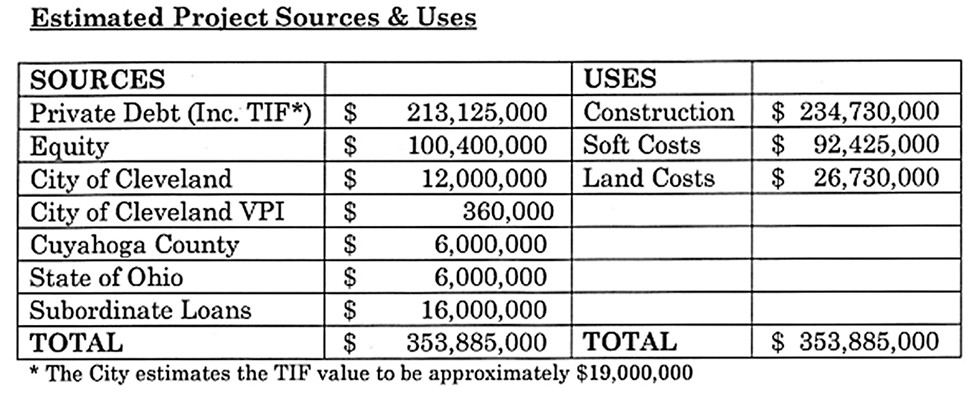"It's going to be sick."
One windy Wednesday morning in March, developer Ezra Stark (of the Crocker Park Starks) and members of the Stark Enterprises marketing and finance teams sat down with Scene to outline their vision for the nuCLEus project downtown. Stark wanted Scene to see for ourselves, he said, "the excitement and change [nuCLEus] is bringing to the city."
The proposed $350 million multi-use project with the exasperating print styling — nuCLEus — has been scaled back from a 54-story, $500 million Jenga tower design. The original sci-fi high-rise was meant to do for Cleveland's skyline in the 21st century what Terminal Tower did for it in the 20th.
"Can you imagine if the Terminal Tower Complex was never built, what the Cleveland skyline would look like?" Stark VP Steven Coven asked a statehouse committee in 2018. "You can't, because it is forever associated with our skyline. It is our goal that our great-grandchildren will be saying the same things about the nuCLEus project 100-plus years from now."
One year later, Ezra Stark told Scene, "that was aspirational, to say we're like Dubai. We're not there yet, but this will still have a dramatic impact."
No question. The project, in its current form, includes two 24-story structures slated to be built on land adjacent to the arena formerly known as the Q. It's the acreage between Huron Road and Prospect Avenue now occupied by surface parking lots and an aging parking structure.
The multi-use project will include 277 residential units, a six-floor internal parking garage with upwards of 1,300 spaces, 400,000 square feet of premier office space and nearly 80,000 square feet of splashy retail. Stark said that virtually all of the nuCLEus retail tenants, including a Starbucks Reserve and other "super trendy" food options that he could not yet specify due to non-disclosure agreements, would be "new to market," meaning unique in Cleveland. The Stark team added that they pride themselves on working with tenants to create dynamic storefronts that "really activate a space."
"It's going to be sick," Stark said.
With gusto, the team painted a high-def picture of a "catalytic" development, one that will continue to attract residents to downtown, retain major Cleveland firms and enliven what Stark called Gateway's "black eye." Comparisons were drawn to both Chicago's Wrigleyville and New York City's Times Square. Architectural renderings overlooking the conference table at Stark's current headquarters on West Third Street corroborated what he called the "ridiculous views" that nuCLEus residents could expect.
From the topmost floors, Stark said by way of example, residents would be able to see home plate at Progressive Field. When asked whether the Indians were all right with that arrangement, Stark said he thinks the team is actually excited about it.
"It only makes the game experience that much better," he said. "It's more active. It's a fuller, more immersive experience for fans. Even fans who can't get into the games will feel the excitement, just by being in that area."
Among the more newsworthy items Stark disclosed about the project was that 62 percent of the office space has been pre-leased, including nine floors (at about 20,000 usable square feet per floor) to Benesch, the region's fastest-growing law firm. Benesch will be the project's anchor tenant, and though the local law office is relocating within Cleveland (from 200 Public Square), Stark characterized the lease as a win for the region, because it means Benesch wants to stay and grow in its hometown, as opposed to in Chicago or San Francisco, where it also has offices.
"Benesch is using the move to nuCLEus as a recruiting tool," he said. "Even though they're relocating, there's so much nuance to this conversation. It's not just about retaining Benesch. It's about growth and the future. Look at what happened to Jones Day. Look at what happened to so many other firms. They all went to New York! We don't want back offices ... I'm sick of treading water."
Stark Enterprises will also relocate to nuCLEus. In fact, they've already sold their current building. But Stark said he'd like to preserve as much of the remaining square footage as possible for out-of-market tenants. He said the significant pre-leasing from regional relocations gave the project stability to finance construction and now means they can pursue companies from out of town, especially those who have expressed interest in Cleveland for satellite offices.
But he said he understands why local companies would be lured to relocate. Compared to other "Class A" office space in Cleveland — the Ernst & Young Building, Key Tower, 200 Public Square — Stark said nuCLEus will be in a class unto itself. Not only will the project be centrally located, unlike the Ernst & Young building on its island overlooking the Warehouse District and the Flats, it will feature efficient design that permits open (or exotically conceptualized) office floor plans, modern technology and amenities typically reserved for residents.
"Indoor and outdoor pools, a lounge, a gym that rivals the Ritz." Stark listed them off. "No, seriously. These are resort amenities, and we're bringing them to our office users."
On the residential side, though the project's units were initially reported as exclusively rentals, Stark said that the top four floors will be available for purchase as condos or penthouses. These would be state-of-the-art residences, he said, the sort of places that celebrity athletes and executives from global brands would consider.
"This is Tier 1," he said. "We really see this as being the Who's Who of Cleveland."
Stark said these residences would also signal to other prospective buyers that home ownership in downtown is important. "This is an opportunity to get people more comfortable by creating a home ownership context where all your services are within the facility," he said. "You can have groceries delivered. You can have your dog walked. It'll be like New York City."
Stark is convinced that demand for luxury housing of this sort is out there. He said if they're successful in pre-selling half of the projected units, they'll move forward with their plan.
The project is "shovel ready," according to the Stark team, confirming earlier reports that they are hopeful to begin construction in August. Stark said that legislation for the project's public financing is making its way along parallel tracks through Cleveland City Council and Cuyahoga County Council and that, barring "FBI raids or something," approval would be forthcoming promptly.
Was he anticipating any objections? Scene wondered.
"No," he said. "I think both because of our reduction in size, and because our public ask is self-sustaining, it should be smooth sailing."
"Our Public Ask is Self-Sustaining"
Throughout our conversation, Stark referred repeatedly to the idea that the public financing for nuCLEus would be "self-sustaining" or "self-generating."
"I don't want to throw anyone under the bus," he said at one point, "but unlike other projects where they've asked for outside dollars, this is only requesting self-generating funds."
Though we didn't fully comprehend it at the time, what he meant was that virtually all of the tax revenue that nuCLEus is projected to generate over the next 20 years will be handed over by the public in advance to help close the financing gap.
"The dollars that are being generated by the project are in the city's calculations, and they're just doing it [providing the subsidy] as a grant," Stark said. "But that's it. It's just the funds being generated by the property. We're not asking any additional dollars. We're not ruining their balance sheet."
An awfully self-serving interpretation, we might note.
Scene referenced both the Quicken Loans Arena expansion and the possible City Block project — the Blockland-affiliated tech hub, about which scant information has been released — and questioned the merits of public subsidies for downtown real estate as the region's modus operandi. Having not seen the project's financing details at the time of our interview, we could only express abstract skepticism that public benefits would equal the public costs.
"You're not the only one who's skeptical," Stark said. "Lenders are skeptical. The banks are skeptical. The banks would never let us do this project speculatively, so the retail had to be significantly pre-leased. The parking is all pre-leased. [Note: It has been master leased to LAZ Parking.] The office space is significantly pre-leased. The only speculative revenue is the apartments, and there's only 250 of them."
But the public subsidies, we now know, are generous.
It was known that nuCLEus would be receiving a tax increment financing arrangement (TIF), which allows developers to invest what they would pay in taxes on the increased value of the property back into the project. Stark initially asked for a full TIF that would have included the portion of property taxes designated for Cleveland schools. (Until that time, full TIFs had been forbidden by Mayor Frank Jackson.) The request included an initial lump sum payment to CMSD, but it didn't gain traction.
The non-school TIF has now been estimated at $19 million. That's $19 million in property tax revenue that the city will forego, an enormous — if increasingly standard — subsidy.
On Monday, April 29, the City of Cleveland introduced legislation to provide Stark with an additional $12 million "forgivable loan." This loan is on top of $360,000 in the form of two Vacant Property Initiative Loans and the city's 15-year tax abatement for new development. Alongside $6 million from Cuyahoga County, $6 million from the state of Ohio and more than $200 million in a witches' brew of advanced financial instruments known as "Private Debt," not to mention the roughly $100 million in private equity, the city's assistance will put the project "over the finish line," according to the legislation's sponsor, Ward 3 councilman Kerry McCormack.
"The long-awaited nuCLEus project will transform a surface parking lot in the middle of Downtown Cleveland to a catalytic $350 Million mixed-use development with new office space, active retail and housing," said McCormack, in a statement provided to the press. "This project will tie together the Gateway District and create a more walkable and connected neighborhood, promoting a positive ripple effect on Downtown and all of Cleveland. The City's investment gets the project over the finish line, with the guaranteed protection that the City will be paid back 110 percent of the dollars put into the project, on top of the many other positive economic impacts nuCLEus will have."
The legislation was scheduled to appear before city council's Development, Planning and Sustainability Committee on Tuesday, May 14, but was postponed. From there, it will pass to the Finance Committee and then receive a vote from the full council.
As Stark said, he's not expecting any objections. Stark marketing director Rebecca Hegyes added that the city has been "extremely supportive."
The $12 million loan is premised, per the analysis of the city's economic development staff, on the notion that nuCLEus will be generating tax revenue, both from parking spaces and from the incomes of the employees who work there.
In the legislation's supporting documents, the city's investment is justified by the fact that Stark has "agreed to a guaranty of created tax revenue sufficient to cover 110 percent [=$13.2 million] of the city's funding outlay." (McCormack alluded to this guarantee, in the comment above, as the city's "protection.")
Though further details were not published in the legislation, city spokespeople told Scene that this 110-percent guarantee was for a 20-year period. But Stark is not paying off the loan over this term. He's merely guaranteeing that the project will generate $13.2 million in tax revenue over 20 years. That's what's meant by a "self-generating" subsidy.
City leaders will nevertheless frame the assistance as an investment, as a loan with favorable terms: "getting the city's money back plus 10 percent." But it's much more accurate to portray it as a handout, another real estate subsidy which means Cleveland will only receive 10 percent of tax revenue that it should be receiving 100 percent of.
This is why the idea of "self-generating funds" is so deceptive. The tax revenue that nuCLEus generates is not designed to be generated for itself. It's tax revenue.
A version of the same argument was made for public expenditures at the Arena formerly known as Quicken Loans. The city's $88 million contribution comes largely from admission taxes on ticketed events at the Q. Proponents argued, then, that only those who attended the events were paying for the upgrades. The funds were self-generating.
In a related FAQ that CMSD created to discuss the proposed nuCLEus TIF, the theoretical question was asked: "If the proposal is accepted, how will my property or city taxes be impacted?" The answer was: "Your property or city taxes will NOT be impacted."
But that's not quite true.
Because when the tax burden on developers and corporations are lifted, citizens pay in other ways. Sometimes it actually is in the form of higher taxes, as in the city of Cleveland's income tax increase of 2016. More commonly, citizens pay in terms of services that aren't provided because of a lack of funds. Pick your city department or crisis and consider the financial woes: Why are the police department's sex crimes and homicide units severely understaffed? Why do the roads never seem to get paved? Why has the lead crisis become such an unsolvable quagmire?
At a city council hearing on lead last week, council members were proposing taxes on potato chips and soda pop because they couldn't conceive of how they'd pay to remediate homes owned by low-income families. The meeting was one week to the day after the announcement of the $12 million grant for nuCLEus.
"Let's Talk about the Social Piece"
The terms of the loan are subject to amendment during the legislative process, though the "legislative process" tends to be a formality in Cleveland. The decision has already been made. "The city of Cleveland has chosen to make this investment," reads the press release announcing the legislation.
But council should investigate the true economic impact of the project if the city intends to forego 30 years of property tax revenue and roughly 20 years of all other tax revenue. (Incidentally, should parking tax revenue even be considered in the arithmetic of the city's contribution? The county's 8-percent parking tax — the highest in the state — goes chiefly to funding FirstEnergy Stadium.)
Among other things, Stark himself doesn't even know how many out-of-market employees will be working in nuCLEus. Attracting tenants is still a work in progress. He said he's "shooting for" a third of the building to be occupied by new-to-market companies. But it's possible that 75 or even 85 percent of the office tenants — whose incomes will be subject to Cleveland taxes — will have already been working in Cleveland; incomes, in other words, that would have been taxed anyway. Should those be factored into the terms of the forgivable loan?
Presumably, the city took all this into account. Spokespeople didn't elaborate much, though we report with elation that our emailed questions were answered. When asked how the values were arrived at, the city said: "The proposed $12 million and 110 percent guaranty were determined based upon the project financing gap and the projected tax revenues to be earned by the City."
A Plain Dealer report on the city's legislation said that the incomes of Benesch and Stark employees were not factored into the payback calculations.
Stark maintained that these public dollars were vital to attract private investment. And even with those dollars, he said, "it's still a tight return."
But nuCLEus sits within an Opportunity Zone, the federal designation designed to help attract private investment to ostensibly impoverished census tracts by allowing investors to postpone or forego taxes on their capital gains. Stark said the Opportunity Zone designation "is that cherry on top to hopefully incentivize out of state investors to take an okay return because of the tax benefits."
When asked about the project's benefits — a line of inquiry that city council should probe in detail — Stark said that he and his company were committed to Cleveland, and that they are planning to go above and beyond. At the Beacon, the Stark residential high-rise currently under construction at Euclid and East Sixth, Stark said they've had interns from John Hay and Kent State.
"It's been an incredibly rewarding experience for us to provide mentorships and real-life experience for these kids," he said. "I see the need. I see the dearth of mentorships and opportunities in these neighborhoods. People always want to know, how does this project spill into the neighborhoods."
How does this project spill into the neighborhoods, Scene wanted to know.
"Look, there's economics of how it does, but let's talk about the social piece. There are the requirements in construction for minorities. But I want to take it a step further than that. Instead of just those temporary jobs, we're going to partner with some nonprofit people and do some job fairs in these neighborhoods. I want to hire some local people and train them in hospitality and operations. People from the neighborhoods. I don't want anyone left behind. I want this to be catalytic not just for the urban core, but on a personal, individual level. We're pretty stoked about that."
Time will tell, of course, whether and to what degree any of these forecasts come to fruition. When Scene said, "If that happens ... " Stark cut us off. "Oh, we're doing it," he said. "We're doing it."
What is almost certain is that city council will rubber-stamp the legislation — more than likely an "emergency ordinance" — and will praise, throughout their hearings, the strength and transformational vitality of buildings like this one. (Cuyahoga County and the State of Ohio can be counted on to do the same.)
And when the next crisis befalls the citizenry, when the people in their desperation are compelled once more to demand new and better programs, new and better facilities, new and better leadership, new and better solutions, that old familiar refrain will resound from every speaker and livestream in every hall of power:
"But how will we pay for it?"

















